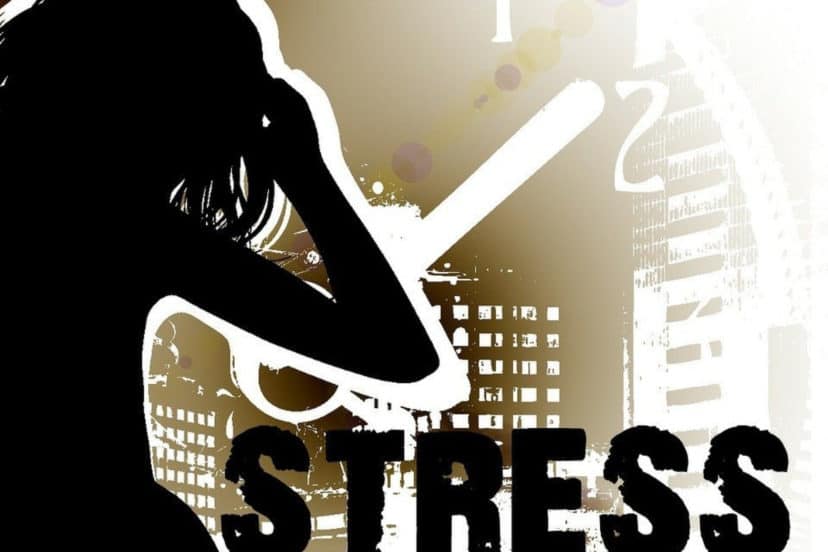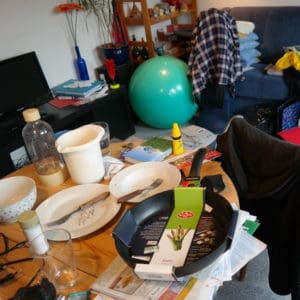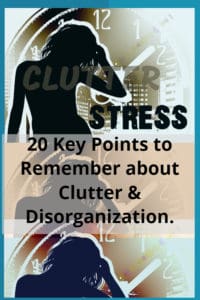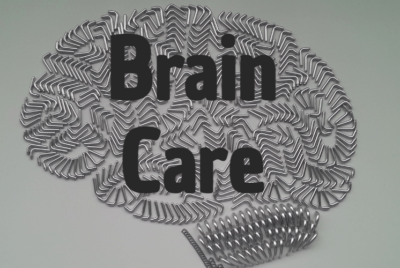Clutter and Stress

Imagine this, you get up in the morning and as you get up to go to the bathroom. You hit your toe on a box that’s been sitting there for months. You curse and start hopping on one foot. You go into the bathroom, and piles of clothes for laundry are on the floor. You go into the sink to brush your teeth, and your hands hit a bottle of lotion, one among the many bottles on the sink. It falls on the ground and spills on the floor.
You have barely started your day, and your nerves are already on edge, you’re irritable. You have stressed out already.
Can you function in this clutter? You may be able to for a short while, but I bet that you are disorganized and all stressed out.
You cannot live in this clutter day in and day out and expect to have a happy, sunny, positive disposition.
“Clutter is an overabundance of possessions that collectively create chaotic and disorderly living spaces,” said Joseph Ferrari, a professor of psychology at DePaul University in Chicago. He studies the causes of clutter and its impact on emotional well-being. And a cluttered home, researchers are learning, can be a stressful home.
As a working mother, we find that we have to have a system of organizing things daily to prevent things from piling up to the point that it is impossible to keep up. This is important for your sanity, your attitude, your health.
In the said study, the wives who perceived themselves as having a cluttered home or a home that needed work tended to have increased cortisol levels throughout the day.
Darby Saxbe, an assistant psychology professor at the University of Southern California and the lead author, said that the women in the study who described their home as being cluttered or needing work began their day stressed and remained stressed. Some of the added stress, she suspects, was tied to women’s tendency to take on housework and extra chores after the workday.
 Clutter and Disorganization
Clutter and Disorganization
Here are my 20 key points to remember about clutter and disorganization.
1. Clutter is stuff lying around you with no semblance of organization.
2. Clutter is a result of our inability to make a decision. Indecision as to simply answering the question. Do I need this right now? Decide to keep or toss it.
3. The things that should be in your space are supposed to be the things that you need to do throughout your day. If you have things that do not contribute to you, they are clutter and need to be stored or tossed.
4. Clutter also signifies procrastinators. You do not want to deal with things in the here and now and keep putting them off. A simple one would be our mails. We receive a stack of mail every day. And if you do not make a keep it and toss it decision when you get the mail. They will pile up, which makes it harder to deal with it. You get overwhelmed, and then you do not want to deal with it, and the cycle continues.
5. Productivity is negatively affected at work and at home by clutter. Waking and seeing clutter everywhere drains you. The mind and body become lazy, and energy decreases.
6. Clutter affects mental and physical health in many negative ways. We are not stressed When our surroundings are clean and organized. We are calm. We can think clearly. We can work smoothly. We have better attitudes, and our health is better.
7. Family and social relationships may be negatively affected by clutter. Too much clutter in the home brings the feeling of overwhelm, increasing stress, and affecting attitude. We are easily angered and nonproductive.
8. Clutter can take a toll on your finances. You are buying stuff that you do not need. Or, if you need it, you have it already available but because of the clutter and no organization. You cannot use them because you cannot find them-duplicating items which is an unnecessary expenditure of money.
9. Clutter is a time-waster. You can lose up to an hour a day looking for things due to clutter when you don’t organize our things. It becomes harder to find items, and undue time is wasted on looking for the things that we need.
10. Problems with clutter are on a continuum and can range from mild, moderate to severe.
11. Even mild challenges with clutter can harm your life and career because clutter causes you to be stressed and frustrated, affecting family life and work.
12. Organizing and staying organized requires that everyone in the house do their part.
13. Clutter can be avoided if we do things in the now. Act now, no later on.
14. If you do not know what to do or you are just feeling overwhelmed. Ask for help! Friends, family, and professional organizers may be beneficial.
15. If the problem is extreme, mental health assistance may be required.
16. Clutter is not safe. Too much clutter can increase trips and falls. Paper clutter is a fire hazard. Clutter promotes the collection of dust, mold, mosquitos, and rodents thrive, leaving animal dander, which is harmful to the residents in the home, especially if they have respiratory diseases like asthma, allergies, Chronic Obstructive Pulmonary Disease (COPD).
17. If you have a cluttered space: home or office. Tackle one project, one corner, one room at a time. It helps to have a separate container for keeping, donating, throwing, and have a specified date to tackle the contents of this box. Label the containers using a sticky note with storage, donate, throw.
18. To deal with clutter. We need to let it go. Identify why you are holding on to this and let it go. Clearly define in your mind the things that you need in your space right now. Having a clear vision just makes handling clutter easier.
19. As you control clutter, we begin to feel better and take care of ourselves better.
20. To avoid clutter from coming back. Maintenance is key. Handle small tasks now.
 Dealing with Clutter
Dealing with Clutter
Clutter causes stress. This is an avoidable stressor that we can face and take action. Our home should be our place of comfort, safety-a place to rest. But we cannot do that if we have a house full of clutter.
We do not have to do it all at the same. Look at your house and identify the clutter rooms and areas. Divide the room into areas or sections and go from there. Schedule a day of the week to do that room and that section. Set aside one to two hours to just do that section until it is done and move on from there. Write all this down on your whiteboard, so it serves as a constant reminder as it is visible to you all the time.
Do this every week, and you will find that you have a house after a few weeks that is organized and clutter-free. A home that not only gives you sanctuary and refuge but comfort, rest, and rejuvenation.
Declutter for a healthy, stress-free life one area at a time.
Source: Ferrari, J.R., Roster, C.A. Delaying Disposing: Examining the Relationship between Procrastination and Clutter across Generations. Current Psychology 37, 426–431 (2018).
Like this Article? Pin it to Pinterest




